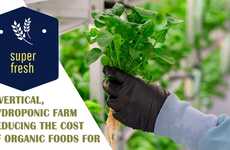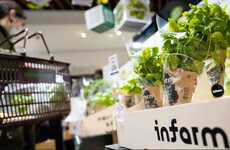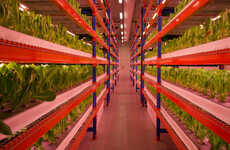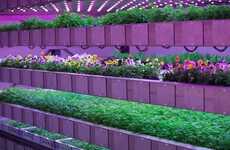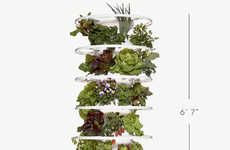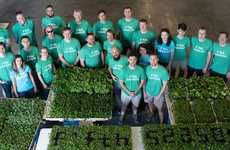
This Startup Supplies Alaskans with Fresh Produce Year-Round
Katherine Pendrill — January 19, 2016 — Eco
References: aknaturalorganics & fastcoexist
'Alaska Natural Organics' is a vertical farming operation that supplies Alaskans with fresh produce year-round. While vegetables are regularly shipped into Alaska, transportation takes it toll on the quality of the produce received. Alaska Natural Organics is trying to combat this problem by making it easier to grow food in the state's cold climate.
Alaska Natural Organics is an indoor farming operation run by Jason Smith. The farm is housed inside a former warehouse that is equipped with rows of LED lights. These lights help to grow organic vegetables such as butter lettuce and basil during the winter months. As a result, the vertical farming operation helps to improve the local produce supply while also offering a more sustainable alternative to importing.
In a state where 85 percent of people eat less than two servings of vegetables per day, access to fresh produce year-round could help to drastically improve consumer health.
Alaska Natural Organics is an indoor farming operation run by Jason Smith. The farm is housed inside a former warehouse that is equipped with rows of LED lights. These lights help to grow organic vegetables such as butter lettuce and basil during the winter months. As a result, the vertical farming operation helps to improve the local produce supply while also offering a more sustainable alternative to importing.
In a state where 85 percent of people eat less than two servings of vegetables per day, access to fresh produce year-round could help to drastically improve consumer health.
Trend Themes
1. Vertical Farming - Indoor and vertical farming can offer year-round fresh produce, especially in harsh climates.
2. Local Food Supply - Farming operations that focus on local food supply can offer fresher produce while reducing transportation costs and emissions.
3. Sustainable Agriculture - Sustainable, energy-efficient farming practices can offer a more eco-friendly way to produce food, reducing resource waste and pollution.
Industry Implications
1. Agriculture - Developing indoor and vertical farming solutions can revolutionize agriculture, offering efficient, year-round food production.
2. Food Distribution - Building a stronger local food supply chain can benefit the food distribution industry by reducing transportation costs and emissions while increasing customer satisfaction.
3. Energy - Integrating more sustainable farming practices can drive innovation and growth in the energy industry, offering alternative sources of energy such as LED lighting and renewable energy sources that can power indoor and vertical farms.
6.4
Score
Popularity
Activity
Freshness


